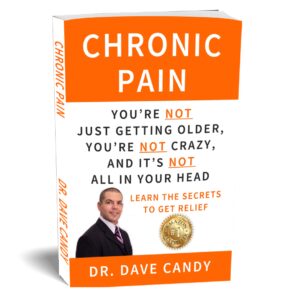Looking For Dry Needling In St. Louis?
We're one of the few places in St. Louis that offers dry needling by a fully-certified dry needling therapist
If you suffer from chronic, nagging Muscle Aches, Pains, Or Stiffness, dry needling may be just what you need to relieve those deep muscle knots that either won't go away or keep coming back.
Want To Learn How Dry Needling Can Help You?
Talk to our Certified Myofascial Trigger Point Dry Needling Therapist
Look What People In St. Louis Are Saying About Dry Needling At More 4 Life
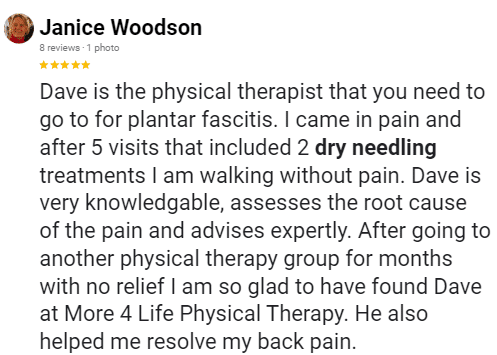
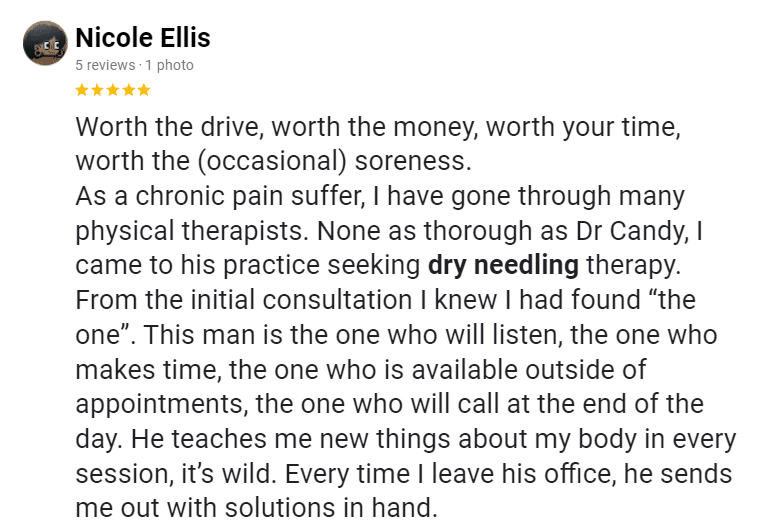
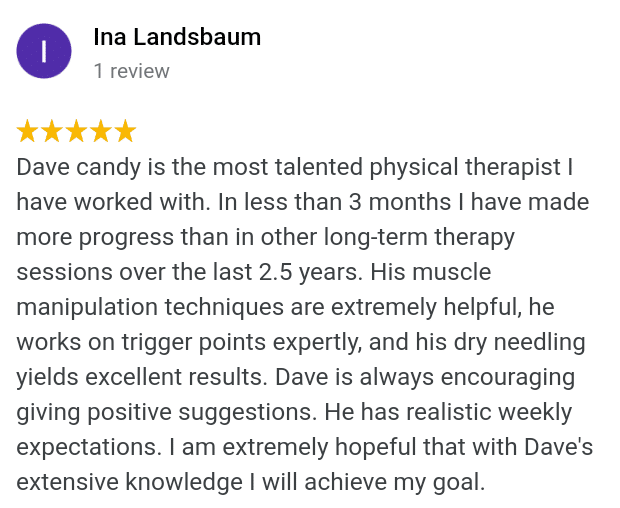
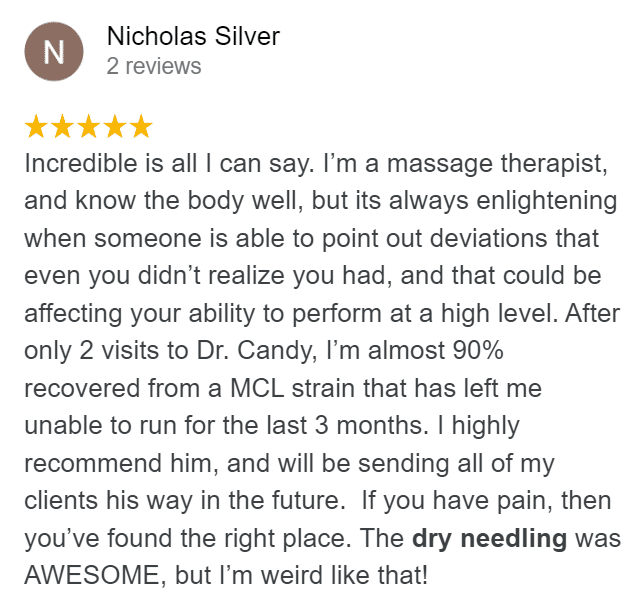
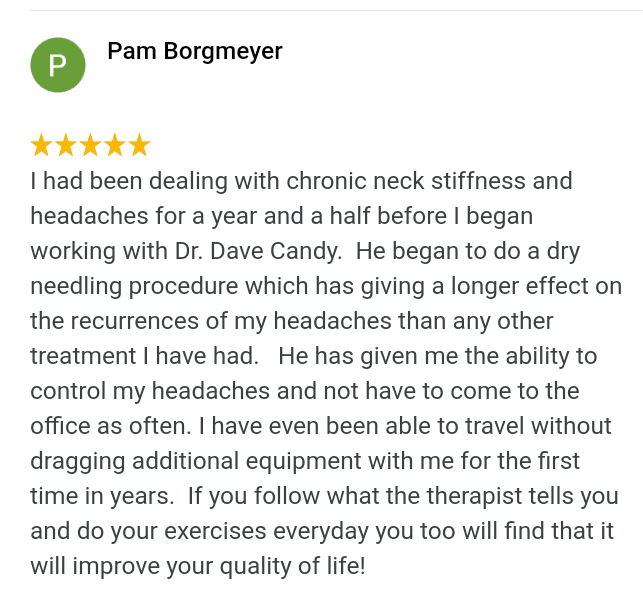
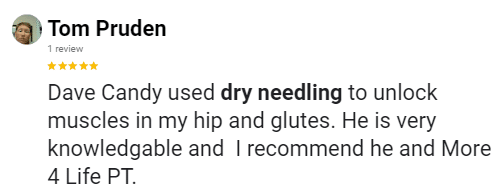
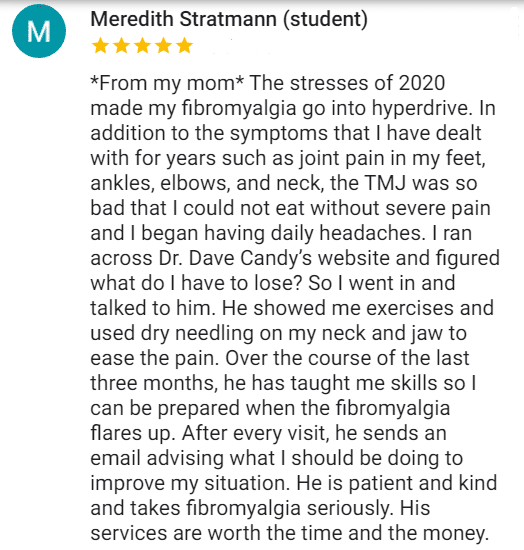
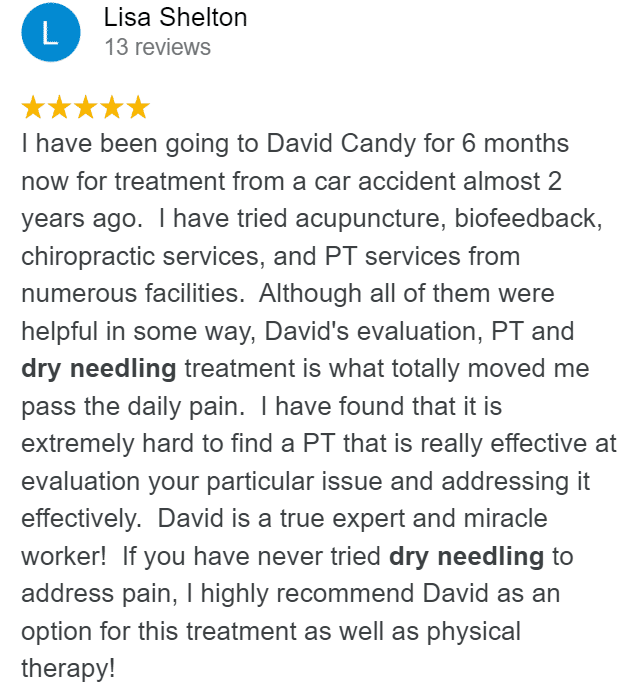
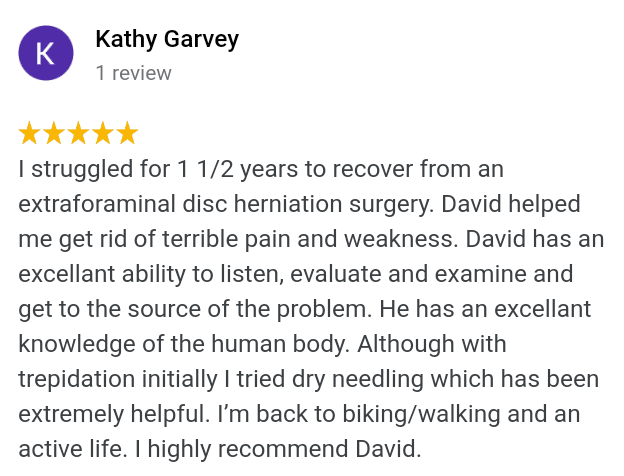
Learn More About Dry Needling And How It Can Help You
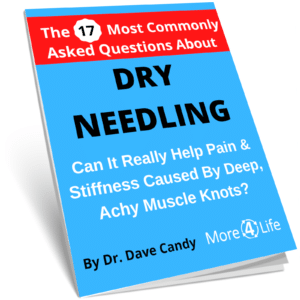
What Is Dry Needling?
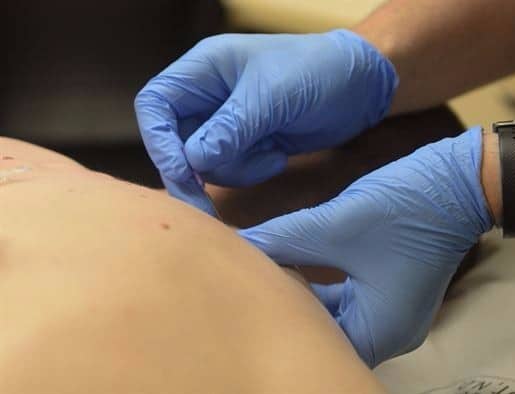
What Is Dry Needling?
Dry needling is a treatment that uses a thin (0.3mm), solid needle in order to relieve pain and stiffness caused by deep muscle knots called myofascial trigger points.
It is called "dry needling" because there is no medication or other liquid that gets injected ("wet needling").
So how could dry needling work if there's no medication?
To understand how dry needling works, you first have to know a little more about trigger points.
A myofascial trigger point is a highly sensitive area in a muscle that presents clinically as a painful "knot". These knots are sometimes so hard that they feel like bone.
Trigger points are so painful because they cause the muscle to spasm and be unable to relax. Imagine how tired your arm muscles would be if you were carrying around a heavy weight all day... That's exactly what the muscles around your neck, shoulders, and back do all day long!
When a dry needle is inserted into the trigger point, it allows the muscle knots to relax and helps restore normal blood flow to the area, which brings oxygen and cells that help with tissue healing and repair... the things you need to relieve pain & and stiffness and get back to living the life you want!
What Is Dry Needling Good For?
Dry needling is excellent for stubborn muscle pain that has failed to respond to respond to other treatments. Many patients leave the office that day with an immediate improvement in symptoms.
However dry needling is usually only one part of an overall treatment plan, because if you don't change what caused the trigger points in the first place, they're likely to come back. However, for chronic muscle pain, dry needling is often the "key" to allowing other treatments to be more effective.
What Kinds Of Problems Can Dry Needling Help?
Dry Needling Can Help:
- Chronic Back Pain
- Hip Pain & Hip Bursitis
- Knee Pain (including knee arthritis)
- Neck Pain
- Shoulder Pain (including rotator cuff)
- Headaches & Migraines
- TMJ / TMD (Temporomandibular Joint Disorders)
- Plantar Fasciitis
- Achilles tendinopathy
- ...and many other painful conditions caused by chronic muscle stiffness
Want To Discover How Dry Needling Can Help You?
Click the button below to request a Discovery Visit to find out if dry needling is right for you
Why Don't More Places In St. Louis Offer Dry Needling?
Dry needling is an advanced skill that takes a considerable amount of post-graduate training. It's important for the practitioner to know how, when, where, and on whom to use dry needling... and when it's NOT appropriate to use dry needling.
Entry-level Doctor of Physical Therapy Programs don't include dry needling in their curriculums. There are a growing number of course on how to do dry needling, but not many physical therapists in St. Louis are currently doing dry needling.
Does A Provider Have To Be Certified To Do Dry Needling?
No. In Missouri, dry needling is unregulated, meaning basically any healthcare provide who has dry needling in their scope of practice can perform it. Of the physical therapists who do perform dry needling, most have only taken one or two courses and then start practicing.
Dr. Dave Candy is the one of only a few physical therapists in the St. Louis area that has completed the 100+ hours of training needed to become a Certified Myofascial Trigger Point Therapist through Myopain Seminars.
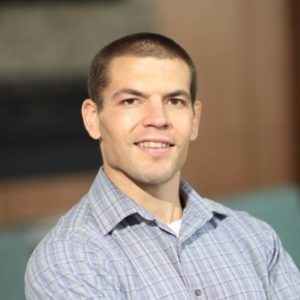
Dr. Dave Candy, PT, OCS, ATC, CMTPT FAAOMPT
Want To Find Out How Dry Needling Can Help You?
Click on the button below to request Discovery Visit!
Dry Needling Frequently Asked Questions
Dry needling is not new, but its use in the United States, and particularly in is fairly new, so many people know about it. In, fact More 4 Life is one of the few practices where you can get dry needling in St. Louis. Here's a list of frequently asked questions:
#1 FAQ: Is dry needling similar to acupuncture?
There are many similarities and differences between dry needling and acupuncture:
The similarities between dry needling and acupuncture include:
- The same needles. Dry needling and acupuncture both solid and very thin needles (0.3 mm).
- Many of the myofacial trigger points treated with dry needling align similarly with acupucture points, although the depth may be different (see below).
The differences between dry needling and acupuncture include:
- Dry needling has its roots in Western medicine, and is very much like a trigger point injection ("wet" needling), just without the medicine (it's a "dry" needle). Acupuncture is base on Eastern medicine and is thought to affect the flow of of "Qi" or "life energy".
- While myofascial trigger points treated with dry needling often line up with acupuncture points, acupuncture points are thought to lie right under the skin whereas the trigger points are deeper - inside the muscles themselves. Dry needling treatment is usually deeper than acupuncture to help relax deeper muscle knots.
- Dry needling is a “technique” acupuncture is “professions”. Dry needling falls under the scope of practice of many professions, including physical therapy, acupuncture, chiropractic, and osteopathy to name a few.
How does dry needling work?
The exact mechanisms of dry needling are not known. There are mechanical and biochemical effects. Based on studies conducted at the National Institutes of Health (NIH), we know that there's a buildup of chemicals near myofascial trigger point. Inserting a needle into a trigger point activates spinal reflex which relaxes the muscle and causes an immediate decrease in the amounts of these pain-provoking chemicals, which can assist in reducing pain.
What type of problems can be treated with dry needling?
Dry needling can be used for a variety of musculoskeletal problems in which muscles are thought to be a primary contributing factor to the symptoms. Dry needling is great for back pain, neck pain shoulder pain, headaches and migraines, TMJ (jaw pain), fibromyalgia and other chronic muscle pains. If you're not sure if dry needling is right for you, you can Talk To Our Specialist On The Phone for Free to find out if dry needling can help you!
Is the procedure painful?
Most patients do not feel the insertion of the needle. The "local twitch response" when you hit the right spot may cause a very brief (less than a second) painful response. Some patients describe this as a little electrical shock; others feel it more like a cramping sensation. However, that is a good and desirable reaction - if you get that "local twitch response" it probably means the dry needling was effective.
Are the needles sterile?
Yes, we only use sterile disposable needles.
What side effects can I expect after the treatment?
Most patients report being sore after the procedure. The soreness is described as muscle soreness over the area treated and into the areas of referred symptoms. Typically, the soreness lasts between a few hours and two days, followed by considerable pain relief and improved mobility.
What should I do after having the procedure done?
Our recommendations vary depending on the amount of soreness you have and on the individual response to the treatment. Recommendations may include applying heat or ice over the area, gentle stretches, and modifications of activities. You should keep moving though... dry needling gives you a "window of opportunity" to address the things that caused the trigger points in the first place, so that the pain doesn't come back.
How long does it take for dry needling to work?
This varies from person to person. Many patients feel some immediate change in symptoms on the first treatment. However, it typically takes several visits in order to get lasting relief. You can request a Discovery Visit, and we can give you a better understand of what's wrong and how long it would take YOU to get lasting relief.
Why is my doctor not familiar with dry needling?
In the United States, dry needling is a relatively new method for treating myofascial pain, and not everyone is already aware of it. In addition, there are not many clinician who perform dry needling in St. Louis. If after having dry needling, you feel like it really helps you, make sure to tell your doctor about your experience so he or she can tell other patients about it.
Where does dry needling fit in the entire treatment program?
Dry needling is used in order to break the vicious cycle of pain causing muscle spasm causing more pain. Once that's achieved, we will teach you the things you need to do over the long-term to make sure that the pain doesn't come back.
Once I'm feeling better, how often do I need to come back to maintain my progress?
That largely depends on you! Dry needling gives you a window of opportunity to do the things you need to get and stay better. If you do the right things (which we'll teach you), you may not need to come back. If you go back to old bad habits, you may need to come back for recurrent treatments.
A regular exercise program, good posture and body mechanics, and a healthy lifestyle can prevent many problems from recurring. But flare-ups do happen from time-to-time, and if you need a "tune up" you can call us as needed to schedule a follow-up appointment. Like your car, your teeth, and your air-conditioner - things work better for longer when you take good care of them before they break down.
How can I get more information about dry needling?
You can call us at 314-941-3970 to Talk To A Specialist On The Phone.
Want To Find Out How Dry Needling Can Help You?
Click on the button below to request Discovery Visit


